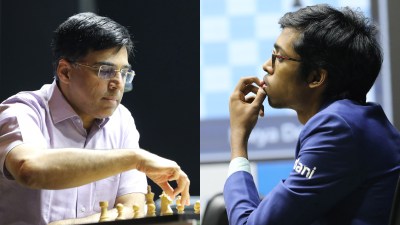Act by talking
Hastening slowly. That seems to sum up the Indian government's approach to the hijacking of flight IC 814. Indeed, it has very little choi...

Hastening slowly. That seems to sum up the Indian government8217;s approach to the hijacking of flight IC 814. Indeed, it has very little choice in the matter.
It has to ensure the safety and well-being of 154 exhausted, terrorised hostages, even as it gets down to tackling a group of masked men who have already demonstrated their capacity for unprecedented cruelty and cold cunning. Since they cannot, given the present circumstances, be neutralised physically, they need to be neutralised ideologically. And the only way this can be done is by getting the very forces whom the hijackers may be tempted to regard as their natural allies to come out strongly against their insane project.
This is why the recent move to talk to the UAE and Saudi Arabia assumes such importance. It should, in fact, have been done much earlier. If these nations can be persuaded to play a constructive role in resolving the Kandahar stand-off, it would go a long way in isolating those masked men in that Airbus. It would, besides, bring some additional, much needed, pressure on the Taliban since it is only these two nations, apart from Pakistan, which have officially recognised the Taliban regime in Afghanistan. There is also no denying the influence the Taliban has on the hijackers. The fact that they chose to take the hijacked aircraft to Kandahar and their willingness to drop two of their earlier demands the sum of 200 million and the body of Sajjad Afghani because the Taliban shura had ruled that these were 8220;unIslamic demands8221;, clearly demonstrates that influence.
The Taliban, from the evidence at hand, has behaved with admirable responsibility and restraint, as the Indian government has been quick toacknowledge. The regime, which has been discredited in the eyes of the world for its general conduct in combat and its fundamentalist crackdown on Afghanistan8217;s civil society, possibly views the hijacking as an opportunity to rehabilitate itself internationally. Whatever the Taliban8217;s motivations may be, the Indian government must, at this crucial point in the negotiations with the hijackers, ensure that the Taliban is on its side.
In India, there is a public perception that the international community has been slow to react to the crisis in Kandahar and the holiday season has been cited as one of the reasons for this presumed apathy. Fortunately, the phrases of condemnation have now been slowly trickling in. While Russia was the first among world communities to react, with its deputy UN ambassador, Gennady Gatilov, even describing it as an 8220;explosive situation8221; and calling upon the Taliban to 8220;actively assist in resolving the critical situation8221;, the US state department has asked for the 8220;immediate safe release of all hostages8221;. Other countries like Japan have also issued strong statements. India must now build on this climate of world opinion and press for a UN Security Council resolution on the hijacking. The world must unite against the terrorist-hijacker, whoever he may be, wherever he may operate from. This has become the commonsense of the times. No nation no matter how powerful, no matter how influential can consideritself immured against the depredations of the terrorist.
- 01
- 02
- 03
- 04
- 05































